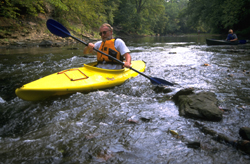 |
|
-April 2006- |
|
Earth Day: Past, Present, and Future
In the early 1960s, Wisconsin Senator Gaylord Nelson wanted environmental issues to be included as a part of the national political agenda. To that end, he persuaded President John Kennedy to go on a national conservation tour, which took the President to eleven states in five days. Although that effort was not a political success, "it was the germ of the idea that ultimately flowered into Earth Day." The growth of citizen-based activism in the 1960s became a model for Senator Nelson of how to achieve political recognition of environmental issues. In September 1969 Senator Nelson announced there would be a nationwide demonstration in the spring of 1970 on behalf of the environment. In response to this announcement, thousands of people, from all walks of life, made the commitment to organize and voice their concerns to their elected officials: "The American people finally had a forum to express its concern about what was happening to the land, rivers, lakes, and air - and they did so with spectacular exuberance." *
 What has changed since that first Earth Day in 1970? Congress has passed a myriad of legislation with stated purposes ranging from cleaning up our waterways and air, to protecting endangered species, to improving management practices in our national forests and public lands. There have been successes; reductions in some air and water pollutants, protections of valuable habitats. We have learned about alternative sources of energy and are putting some of those lessons into action. In the thirty-six years that have passed since the first Earth Day, we have also learned more about the complexities of our planet's ecosystems, and about new threats to those ecosystems.
What has changed since that first Earth Day in 1970? Congress has passed a myriad of legislation with stated purposes ranging from cleaning up our waterways and air, to protecting endangered species, to improving management practices in our national forests and public lands. There have been successes; reductions in some air and water pollutants, protections of valuable habitats. We have learned about alternative sources of energy and are putting some of those lessons into action. In the thirty-six years that have passed since the first Earth Day, we have also learned more about the complexities of our planet's ecosystems, and about new threats to those ecosystems.
Earth Day 2006 is a day to celebrate, to be inspired, to think, and to act. It is a day to make choices not just for the present, but for the future. What can one person do? Volunteer, support local organic farms, drive less, walk more, change a habit, let your elected officials know that protecting the environment is not just important, it is essential. As Senator Nelson reminds us: "So long as the human species inhabits the Earth, proper management of its resources will be the most fundamental issue we face…We are not free to decide about whether or not our environment 'matters.' It does matter, apart from any political exigencies. We disregard the needs of our ecosystem at out own peril."**
*Excerpts from a statement by Senator Nelson, located at http://earthday.wilderness.org/history
**Excerpt from Senator Nelson's 1980 Earth Day speech, located at http://epa.gov/history/topics/earthday/02.htm